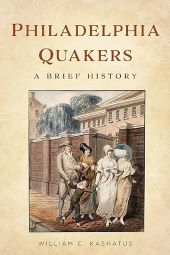Synopsis
Philadelphia Quakers: A Brief History is a concise but insightful account of the Religious Society of Friends, beginning with their founding in mid-seventeenth-century England. Persecuted for his non-conformist beliefs, William Penn, in 1682, established a refuge for Quakers in his New World colony of Pennsylvania. Philadelphia became the capital city of Penn’s utopian colony dedicated to the ideals of religious toleration, participatory government, and brotherly love. Afterward, Philadelphia Quakers became a minority in the City of Brotherly Love, but continued to exercise a disproportionate influence on local, state, and national affairs through such humanitarian reforms as abolitionism, women’s rights, care for the mentally ill, Native American affairs, and prison reform. Quakers also experienced a religious schism between more traditional Quietists and evangelical Friends. That schism plagued Philadelphia Yearly Meeting, the central governing body of Friends, until 1955 when the two sides reunited.
Richly illustrated, Philadelphia Quakers tells the story of a remarkable people whose active commitment to religious freedom, social diversity, and peace has had a profound impact on American society and government.






